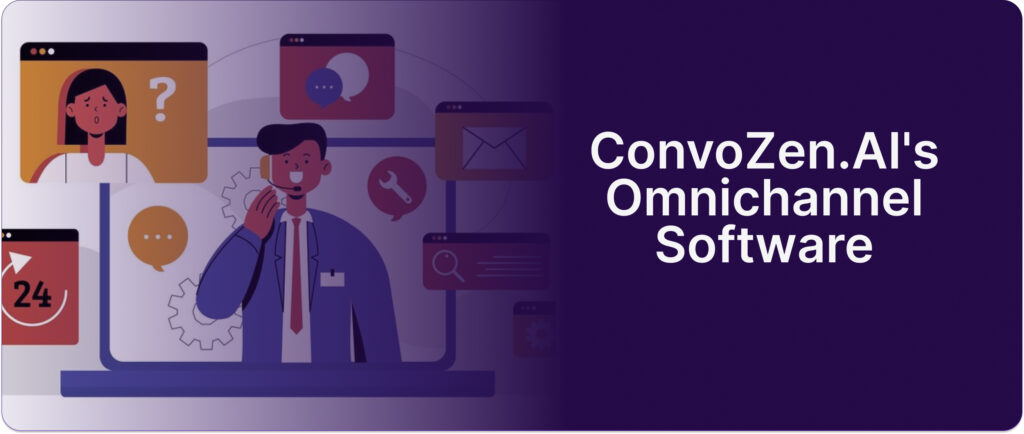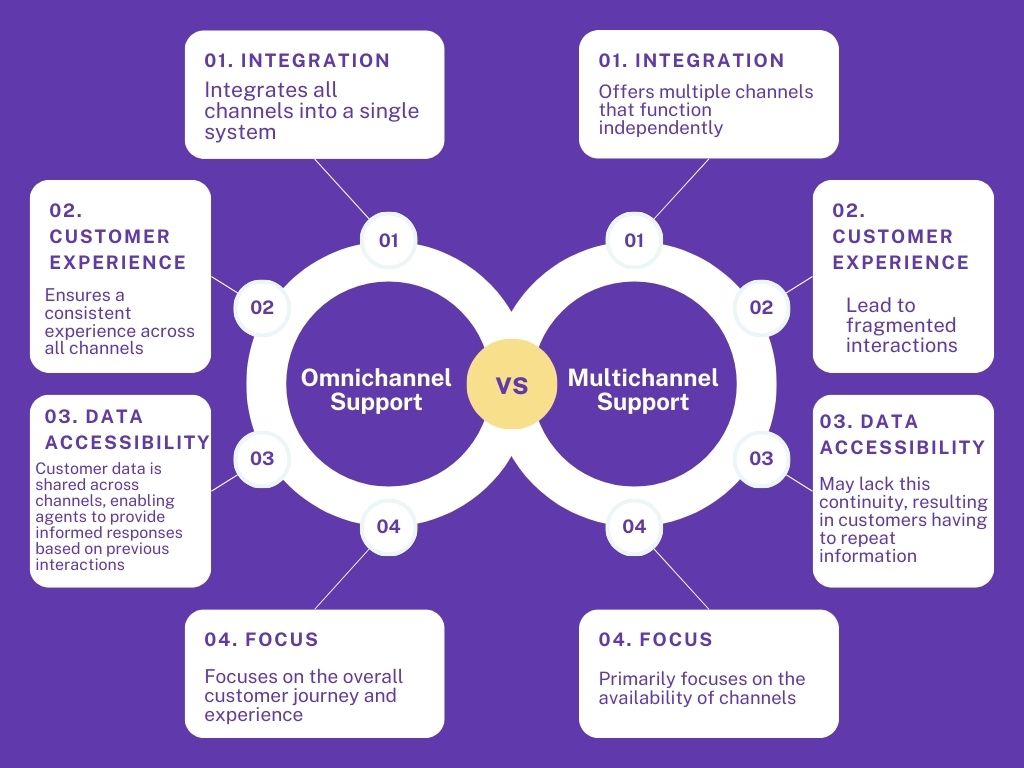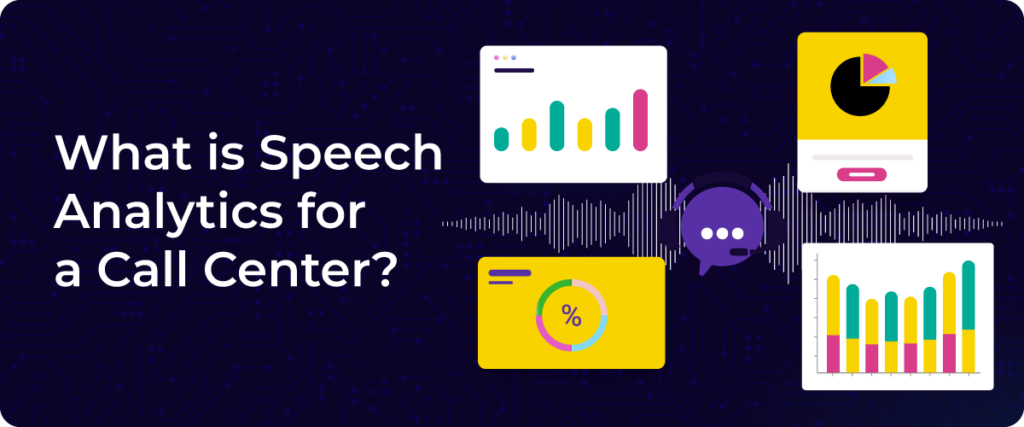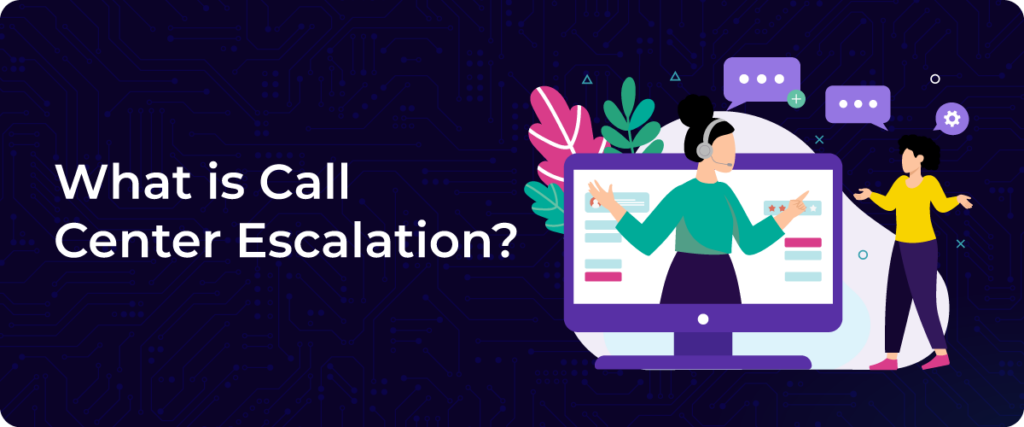
Omnichannel Contact Center Software plays a critical role in business operations, enabling customers to engage with a company through various channels like email, SMS, chat, voice, and video calls.
To meet the expectations of the customers, businesses face ongoing challenges as customers utilize multiple channels to engage with brands, and having a seamless communication strategy is vital.
This is where omnichannel contact center software becomes essential, especially with the innovative solution for various industries offered by ConvoZen.AI, specifically designed for call center directors and heads of customer experience.
Definition of Omnichannel Support
Unlike traditional multichannel systems that operate in bulk, an omnichannel contact center software approach ensures that all interactions are interconnected, allowing customers to switch between channels without losing context.
Omnichannel support refers to the integration of various communication channels—such as phone, email, chat, and social media—into a unified system that provides a seamless experience for both customers and agents.
Difference Between Omnichannel Support & Multichannel Support

to Customer Service
Key Features of ConvoZen.AI’s Omnichannel Contact Center Software
Here are some of the key features and use cases that illustrate its capabilities for Omnichannel contact center software:
1. Automated Quality Assurance (QA)
Identify areas for improvement by evaluating call recordings, chat logs, and customer feedback.
2. Automated Compliance Regulation
Helps organizations comply with industry regulations by automatically monitoring and flagging compliance issues during customer interactions.
3. Sales Automation
- ConvoZen.AI facilitates sales automation by automating repetitive tasks such as lead management, follow-ups, and data entry through various platforms.
- Sales automation ensures that all leads are tracked and nurtured consistently, improving conversion rates and customer satisfaction.
4. Support Automation
Support automation is vital in an omnichannel strategy as it enables customers to receive immediate assistance, providing quick answers to common queries by reducing wait time.
5. Lead Qualification
- In an omnichannel setup, leads can come from various sources, including social media, email campaigns, and website inquiries.
- Automated lead qualification ensures that the sales team focuses on the most promising opportunities, leading to improved efficiency and conversion rates.
Why Adopt Omnichannel Capabilities?
Here are several reasons why adopting omnichannel capabilities is essential for meeting customer expectations and driving business success:
1. Meeting Customer Expectations for Consistency
a. Seamless Interactions
- Customers expect a consistent experience across all channels.
- Research indicates that 76% of customers want uniform communications, which is vital for building trust and satisfaction.
b. Avoiding Frustration
A lack of consistency can lead to frustration. 39% of customers cite having to repeat information as a significant annoyance, highlighting the need for integrated support.
c. Brand Perception
Consistent omnichannel support enhances brand perception, making customers feel valued and understood, which is crucial in today’s competitive market.
2. Adaptation to Multi-Device Usage
a. Diverse Engagement Channels
With 90% of consumers using multiple devices, businesses must ensure that their communication channels are interconnected to meet these behaviors
b. Cross-Platform Interaction
Customers often switch between devices, and omnichannel support enables them to continue their interactions seamlessly.
c. Increased Convenience
An omnichannel approach provides customers with the flexibility to choose how they engage with a brand, improving their overall experience and encouraging continued patronage.
3. Enhancing Engagement and Retention
- Higher Engagement Rates
- Companies that employ robust omnichannel strategies report a 19% increase in customer engagement compared to those with weaker strategies.
- This demonstrates the effectiveness of offering multiple touchpoints for interaction.
- Improved Customer Retention
- Much research shows that organizations with strong omnichannel engagement retain 89% of their customers, while those lacking this capability retain very less.
- This difference emphasizes the impact of a unified customer experience on loyalty.
- Personalized Interactions
- Omnichannel capabilities allow for personalized interactions based on customer history, significantly enhancing customer satisfaction and loyalty.
- Tailored experiences can lead to an increase in revenue.
Conclusion
ConvoZen.AI’s omnichannel contact center software offers a suite of features designed to enhance customer interactions, drive operational efficiency, and ensure compliance across channels like voice, chat, email, and video chats.
Businesses can improve their customer experience by using automated quality assurance and compliance regulation. They can also apply sales automation and support automation. This will help them meet the changing expectations of today’s consumers.
To learn more about how ConvoZen.AI can transform your customer service operations, visit our website or book a demo for a personalized demonstration.
FAQs
Omnichannel contact centers integrate various communication channels—such as phone, email, chat, and social media—into a single platform to provide a seamless customer experience.
In VoIP (Voice over Internet Protocol), omnichannel refers to the ability to manage voice calls alongside other communication methods, such as video calls, messaging, and email, all within the same system.
An omnichannel BPO (Business Process Outsourcing) provider offers comprehensive customer support services across multiple channels.
CRM (Customer Relationship Management) in an omnichannel context refers to systems that capture and integrate customer data from all channels.


